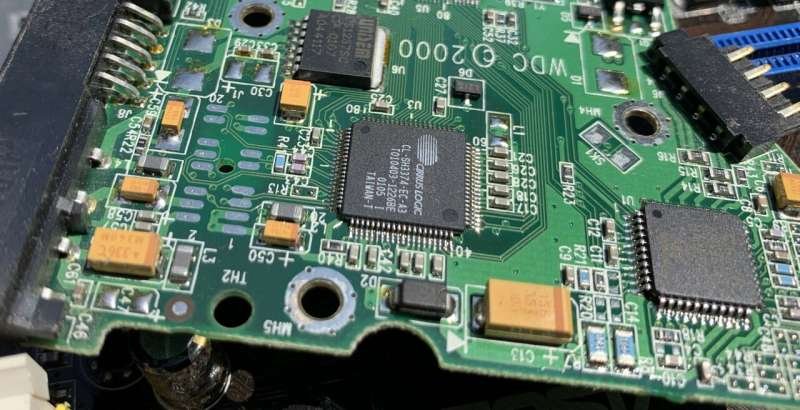
You may not have heard of tantalum, but chances are you’re holding some right now. It’s an essential component in our cell phones and laptops, and currently, there’s no effective substitute. Even if you plan to recycle your devices after they die, the tantalum inside is likely to end up in a landfill or shipped overseas, being lost forever.
As a researcher focused on critical materials recovery, I’ve spent years digging through electronic waste, not seeing it as garbage, but as an urban mine filled with valuable materials like tantalum.
Why tantalum matters
Tantalum is a rare, heat-resistant metal vital for electronic capacitors. These capacitors are tiny devices that store and release energy efficiently in almost every electronic gadget you use. Approximately 24% of all tantalum produced globally ends up in capacitors found in space-sensitive, high-end applications such as smartphones, laptops, medical devices, and even aerospace electronics, where 80% of tantalum capacitors are manufactured as surface-mounted form factor. Without tantalum, many of our essential technologies simply wouldn’t function as effectively.
Yet, this indispensable metal comes at a hefty price. In 2024, tantalum cost US$170 US per kilogram, far pricier than common metals like copper, priced about $9.50 per kilogram. Despite this high value, tantalum recycling remains shockingly inefficient. Traditional recycling methods typically ignore tantalum capacitors because extracting small quantities is energy-intensive, costly, and environmentally risky.
The hidden cost of ignoring e-waste
The reality of electronic waste is troubling. In 2022 alone, the world produced more than 62 million metric tons of discarded electronics. Much of this e-waste is either dumped in landfills or shipped overseas, where unsafe recycling methods, like burning circuit boards or chemically stripping metals, pose health risks and environmental hazards.
With critical materials like tantalum flagged as “high-risk” due to their scarcity and geopolitical constraints, neglecting their recovery exacerbates both economic and strategic vulnerabilities. The U.S. relies heavily on imports of tantalum from countries like China, and supply disruptions can significantly affect industries ranging from consumer electronics to defense technology.
A new recycling approach powered by microwaves
At West Virginia University, in the Department of Mechanical, Materials & Aerospace Engineering, my team and I set out to answer a simple question: could we develop a cleaner, safer, and cost-effective method to recycle tantalum from discarded capacitors?
The solution turned out to be microwaves. These microwaves are similar to the ones used in your kitchen, but more powerful and precisely controlled. Here’s how our process works:
First, we shred discarded tantalum capacitors and mix the resulting powder with carbon-based material. Carbon, unlike water, absorbs microwaves rapidly, allowing us to focus intense, targeted heating directly on the tantalum particles. As microwaves selectively heat the carbon, they trigger a reaction called “carbothermal reduction.”
This process transforms tantalum compounds into pure tantalum carbide, an easily recoverable form with remarkable purity levels, greater than 97%, as we demonstrated in our recent study published in Scientific Reports.
Using microwaves eliminates harsh chemical treatments and drastically reduces energy consumption compared to traditional methods. Additionally, it significantly minimizes harmful waste by-products.
From lab success to industry impact
While initial tests proved our approach effective, the next crucial step is scaling this method beyond the laboratory. Currently, we are working on pilot projects involving larger batches of e-waste, such as smartphone circuit boards and server equipment from data centers to validate the technology’s scalability.
Our initial funding came from DARPA’s Recycling at the Point of Disposal (RPOD) program, reflecting the strategic importance the U.S. military places on the domestic recycling of critical materials. With national security tied closely to technology and resource independence, efficient tantalum recycling could be pivotal not only economically but also strategically.
A sustainable future: Economic and environmental benefits
So, how do we make widespread recycling of tantalum and other critical metals a reality? A significant part of the answer lies in economics. When recycling facilities realize they can profitably reclaim metals worth hundreds of dollars per kilogram using affordable and eco-friendly technologies, the incentives become irresistible.
This story is part of Science X Dialog, where researchers can report findings from their published research articles. Visit this page for information about Science X Dialog and how to participate.
More information:
Ansan Pokharel et al, Microwave-assisted recycling of tantalum and manganese from end-of-life tantalum capacitors, Scientific Reports (2025). DOI: 10.1038/s41598-025-96574-7
Scientific Reports
Terence Musho, P.E., Ph.D., is an Associate Professor in the Department of Mechanical, Materials & Aerospace Engineering at West Virginia University. He earned his doctorate in Materials Science from Vanderbilt University, specializing in first-principles materials modeling. His current research focuses on developing microwave-enhanced pyrometallurgical methods to recover critical materials from electronic waste. His work aims to transform the recycling industry through scalable, energy-efficient technologies that support urban mining and a more sustainable circular economy.


